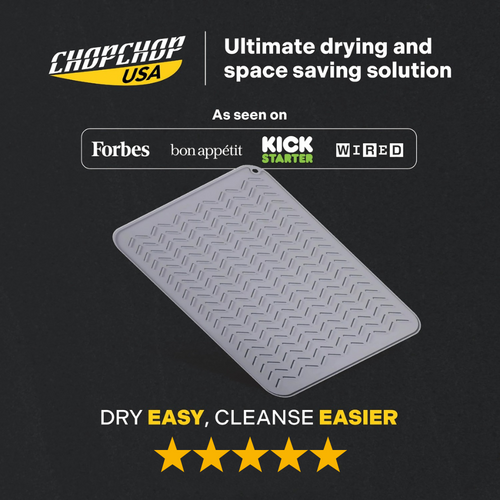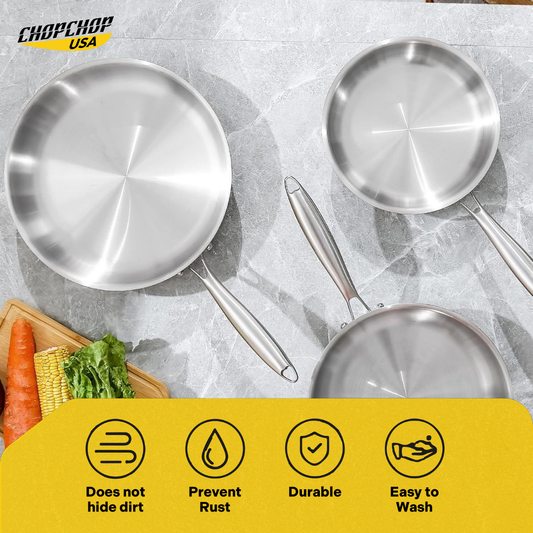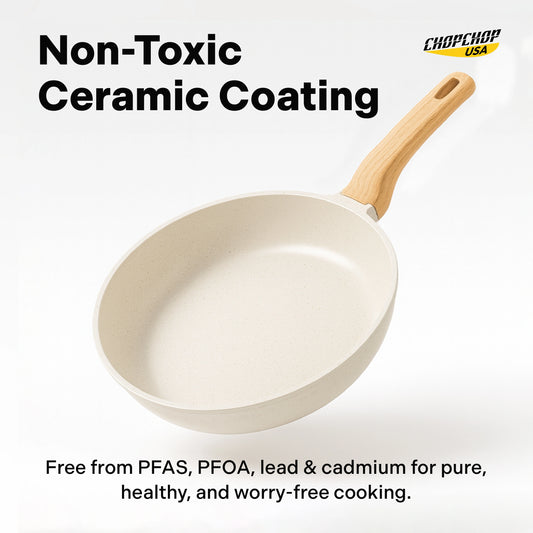What are forever chemicals, and why are they a concern? These man-made substances, known as PFAS, have been used for decades in countless everyday products but don’t easily break down — meaning they can linger in the environment and our bodies for years. Scientists are finding links between PFAS exposure and various health issues, making it important to understand where they’re found and how to limit contact.
In this guide, ChopChop USA explains what forever chemicals are, why they matter, and practical ways to reduce your exposure.
What Are Forever Chemicals (PFAS)?

Source: willcountyhealth
Forever chemicals, scientifically known as PFAS (per- and polyfluoroalkyl substances), are a large group of synthetic compounds developed in the 1940s. They are used to make products resistant to water, oil, heat, and stains. You’ll find them in items like nonstick cookware, waterproof clothing, and food packaging.
PFAS are valued for their durability and versatility, but this same quality also makes them harmful. They don’t break down easily, allowing them to build up in soil, water, and the human body over time.
Research has shown that even low levels of PFAS exposure can lead to health problems, prompting growing concern worldwide about their long-term effects on both people and the planet.
Why Are They Called “Forever Chemicals”?
PFAS are nicknamed “forever chemicals” because of their extraordinary resistance to natural degradation. Their chemical structure includes strong carbon-fluorine bonds — among the strongest in chemistry — which prevents them from breaking down in air, water, or living organisms.
Unlike many other substances that decompose over time, PFAS can persist for decades or even centuries. This means once they enter the environment, they remain there, cycling through soil, water, and wildlife.
Over time, PFAS can accumulate in our food chain and our bodies, where they can remain for years. Because of this persistence and their widespread use, PFAS contamination has become a global issue, affecting drinking water, agricultural systems, and public health.
Where Can You Find Forever Chemicals?
Forever chemicals are found in a wide range of consumer and industrial products due to their unique ability to resist water, oil, and heat. They’re everywhere — from household items to the environment itself.
Common sources include:
- Cookware: Older Teflon and nonstick pans often contain PFAS-based coatings to prevent food from sticking.
- Food Packaging: Fast-food wrappers, microwave popcorn bags, and takeout containers frequently use PFAS-treated paper to repel grease and moisture.
- Textiles and Clothing: Water-resistant jackets, outdoor gear, carpets, and upholstery are often treated with PFAS for stain and moisture protection.
- Personal Care Products: Certain cosmetics, waterproof mascaras, and lotions may contain PFAS to improve texture or longevity.
- Cleaning Products: Some household cleaners and waxes use PFAS for their slick, water-repellent qualities.
- Firefighting Foam: Aqueous Film Forming Foam (AFFF), used for controlling fuel fires, is a major industrial source of PFAS contamination.
Environmental contamination:
PFAS enter soil and water systems through manufacturing waste, firefighting sites, and landfills. Once in the environment, they can contaminate groundwater and surface water used for drinking.
Over time, these chemicals can be found in the air we breathe, the food we eat, and even the blood of humans and animals. Because of their persistence, avoiding them entirely is difficult — but awareness helps minimize exposure.
What Health Problems Are Linked to Forever Chemicals?
Research has linked PFAS exposure to a range of health issues, especially with long-term or high-level exposure. While studies are ongoing, evidence shows that even small amounts can have cumulative effects over time.
Hormone Disruption
PFAS can interfere with the body’s endocrine system, which regulates hormones. This disruption may affect metabolism, thyroid function, and reproductive health. Some studies suggest a link between PFAS exposure and reduced fertility in both men and women.
Immune System Effects
Exposure to PFAS can weaken immune responses, making the body less effective at fighting infections. Research shows that children exposed to higher PFAS levels may have lower antibody responses to vaccines.
Cancer Risk
Certain PFAS chemicals, such as PFOA and PFOS, have been classified by environmental agencies as possible carcinogens. Long-term exposure has been associated with an increased risk of kidney, liver, and testicular cancers.
Read more: Can Nonstick Pan Cause Cancer? Here's The Truth
Liver and Cholesterol Issues
PFAS may affect how the liver processes fats, leading to elevated cholesterol levels and potential liver damage. This can increase the risk of heart disease and other metabolic conditions.
Developmental and Reproductive Problems
Pregnant women and children are especially vulnerable. PFAS can cross the placenta and may impact fetal development, leading to low birth weight, developmental delays, or hormonal imbalances later in life.
Other Health Concerns
Emerging studies have also suggested links between PFAS exposure and obesity, high blood pressure, and immune-related diseases. Although more research is needed, the existing evidence points toward significant long-term risks.
Because PFAS accumulate slowly in the body, even small, repeated exposures can lead to higher concentrations over time. This is why experts recommend taking steps to minimize exposure wherever possible.
Are Forever Chemicals Unsafe?
While PFAS are useful in many modern products, increasing evidence suggests that they pose serious health and environmental risks. They are considered toxic and persistent, meaning they can accumulate in the body and cause harm over long periods.
Regulatory agencies such as the EPA, FDA, and World Health Organization (WHO) are now tightening limits and monitoring PFAS levels in drinking water and consumer products.
Not all PFAS are equally dangerous, but because they resist breakdown and are nearly impossible to remove from the environment, caution is essential. Choosing PFAS-free products and staying informed are simple but powerful steps to protect your health and the planet.
How Can You Avoid Forever Chemicals?
Completely eliminating forever chemicals (PFAS) from your life is challenging, as they’ve been used in thousands of products for decades. However, small, intentional changes in what you buy, cook with, and use at home can make a big difference. By learning where PFAS are found and making safer choices, you can significantly lower your exposure and protect your family’s health.
Choose PFAS-Free Cookware
Older Teflon and nonstick pans were often made with PFAS-based coatings designed to keep food from sticking. Over time, these coatings can wear down and release harmful particles or fumes. Switching to PFAS-free cookware made from safe materials such as stainless steel, cast iron, ceramic, titanium, or carbon steel is a smart way to protect your health without compromising on performance. You can also read Are Nonstick Pans Safe?
ChopChop USA offers a full line of PFAS-free cookware designed to deliver exceptional results, durability, and safety in every kitchen.
Titanium Pan Pro

Engineered for strength and performance, the ChopChop USA Titanium Pan Pro combines lightweight design with outstanding durability. It heats evenly, resists warping, and offers a naturally slick surface — all without any PFAS-based coatings. Perfect for everyday cooking with professional-level precision.
Stainless Steel Frying Pan

Built from premium stainless steel, this pan ensures even heat distribution and lasting durability. Ideal for searing, browning, and sautéing, the ChopChop USA Stainless Steel Frying Pan is a timeless kitchen essential that delivers professional-grade performance without chemical coatings.
Read more:
- Pros and Cons of Stainless Steel Cookware
- How to Cook With Stainless Steel Pans: Tips, Tricks & Common Mistakes
- 3 Ply vs. 5 Ply Stainless Steel Cookware – Which is Better?
Hybrid Nonstick Frying Pan

Featuring advanced microcarving technology, the ChopChop USA Hybrid Nonstick Frying Pan offers the perfect balance of nonstick convenience and stainless steel durability. Its innovative surface allows easy food release while maintaining high-heat performance — completely PFAS-free.
Ceramic Frying Pan

The ChopChop USA Ceramic Frying Pan provides a smooth, non-toxic cooking surface made without PFAS, PFOA, or lead. It’s ideal for low-oil cooking and effortless cleanup, making it a great choice for health-conscious home chefs.
Cast Iron Skillet

Designed for versatility and heat retention, the ChopChop USA Cast Iron Skillet is naturally nonstick when seasoned properly and entirely free from synthetic coatings. Perfect for searing, baking, and slow cooking, it’s a true workhorse that gets better with age.
Carbon Steel Pan

Lightweight yet durable, the ChopChop USA Carbon Steel Pan offers the high heat tolerance of cast iron with faster responsiveness. Naturally PFAS-free and ideal for achieving perfect sears, stir-fries, and crispy textures, it’s a favorite among professionals and home cooks alike.
With ChopChop USA’s PFAS-free cookware collection, you can cook confidently, enjoy cleaner meals, and maintain a healthier kitchen — without compromising performance or flavor.
Filter Your Drinking Water
Drinking water is one of the most common sources of PFAS exposure. These chemicals can leach into water supplies from factories, landfills, and firefighting foam. Using a water filtration system certified to remove PFAS — such as activated carbon or reverse osmosis filters — can greatly reduce your intake.
Check your local water quality reports or environmental health website to see if PFAS contamination has been detected in your area. If so, using a certified home filter or bottled water from a tested source may be a smart precaution.
Limit Packaged and Fast Foods
Many fast-food wrappers, takeout boxes, and microwave popcorn bags are coated with PFAS to resist grease and moisture. These coatings can transfer into your food, especially when heated.
To reduce this exposure, limit the amount of fast food and packaged snacks you consume. When possible, cook fresh meals at home and store leftovers in glass, stainless steel, or silicone containers. It’s a simple change that’s better for your health and the environment.
Be Mindful of Personal Care and Beauty Products
PFAS are sometimes added to makeup, lotions, and sunscreens to improve texture, spreadability, or water resistance. Unfortunately, these chemicals can be absorbed through the skin or enter the body when used around the mouth and eyes.
Check ingredient lists and look for labels that say “PFAS-free,” “PFC-free,” or “fluorine-free.” You can also research brands that prioritize clean beauty standards and disclose full ingredient transparency.
Check Your Household Items
Waterproof and stain-resistant products, such as carpets, upholstery, outdoor gear, and rain jackets, are often treated with PFAS-based coatings. Over time, these coatings can break down and release chemicals into household dust or the environment.
When buying new furniture or fabrics, choose products labeled PFAS-free or opt for untreated materials like organic cotton, wool, or canvas. Regular cleaning and dusting with a HEPA filter vacuum can also help minimize PFAS particles at home.
Support PFAS-Free Brands and Policies
Consumer demand drives change. Supporting companies that commit to PFAS-free manufacturing encourages safer, more transparent practices. Many cookware and lifestyle brands — including ChopChop USA — now focus on using safe, high-performance materials that deliver great results without harmful coatings.
On a broader level, staying informed about new PFAS regulations and supporting policies aimed at reducing chemical pollution can help create a cleaner, healthier environment for future generations.
Stay Informed and Take Small Steps
Avoiding forever chemicals doesn’t have to happen overnight. Start small — swap one nonstick pan for a stainless steel one, or choose a PFAS-free mascara next time you shop. Over time, these small actions add up to meaningful change.
By choosing safer products, filtering your water, and staying informed, you can dramatically reduce your exposure to PFAS while supporting a healthier, more sustainable lifestyle.
Conclusion
Forever chemicals (PFAS) are everywhere — from our kitchens to our environment — and their long-lasting nature makes them a growing concern. While it’s nearly impossible to avoid them entirely, being mindful about the products you use and how you cook can greatly reduce exposure.
Choosing PFAS-free cookware, such as ChopChop USA Cookware Collection — including the Titanium Pan Pro, Stainless Steel Frying Pan, Hybrid Nonstick Frying Pan, Ceramic Frying Pan, Cast Iron Skillet, and Carbon Steel Pan — is an easy and effective way to cook safely without harmful coatings. By making informed choices and supporting trusted, PFAS-free brands like ChopChop USA, you can protect your health, your family, and the planet — one meal at a time.
For more amazing recipes, follow me on Facebook and Instagram! If you have any questions about ChopChop USA's products or promotions, please feel free to contact us at support@chopchopusa.com. Our dedicated team is available 24/7 and always happy to assist you.
Frequently Asked Questions
1. What products contain forever chemicals?
Nonstick pans, food packaging, waterproof clothing, carpets, and cosmetics often contain PFAS.
2. Can PFAS be removed from drinking water?
Yes, certain activated carbon and reverse osmosis filters are effective at reducing PFAS levels.
3. Are all nonstick pans unsafe?
Not necessarily — many modern nonstick pans are now PFAS-free. Always check the product label.
4. How do PFAS enter the body?
PFAS can enter through contaminated water, food, air, or skin contact with treated materials.
5. What is being done to reduce PFAS pollution?
Governments and environmental agencies are enforcing stricter regulations, phasing out older PFAS compounds, and promoting safer alternatives.

















